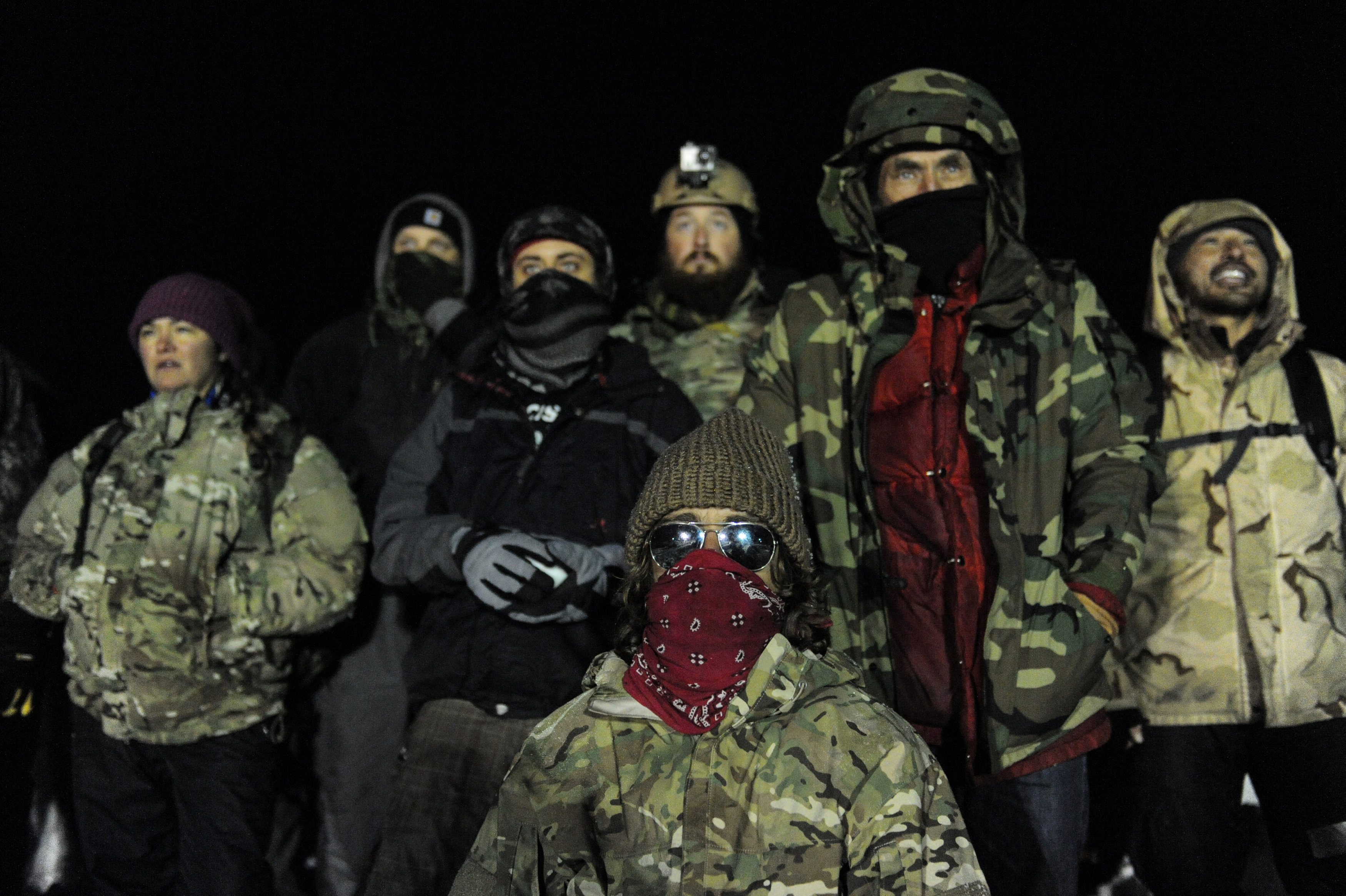By Terray Sylvester
CANNON BALL, N.D. (Reuters) – Hundreds of U.S. military veterans on Friday have been arriving at a protest camp in North Dakota where thousands of activists, braving frigid conditions, are demonstrating against a pipeline project near a Native American reservation.
Veterans Stand for Standing Rock will spend the day building a barracks at the Oceti Sakowin camp near Cannon Ball and coordinating with protesters who have spent months rallying against plans to route the Dakota Access Pipeline beneath a lake near the Standing Rock Sioux reservation, organizers said.

Veterans have a demonstration on Backwater bridge during a protest against plans to pass the Dakota Access pipeline near the Standing Rock Indian Reservation, near Cannon Ball, North Dakota, U.S., December 1, 2016. REUTERS/Stephanie Keith
Some of the more than 2,100 veterans who signed up on the group’s Facebook page have arrived at the camp, with hundreds more expected over the weekend. The veterans intend to form a human wall in front of police to protect protesters, who say the $3.8 billion pipeline poses a threat to water resources and sacred Native American sites.
State officials on Monday ordered activists to vacate the camp on U.S. Army Corps of Engineers land, citing harsh weather, but said on Wednesday they would not enforce the order.
“There is an element there of people protesting who are frightening,” North Dakota Attorney General Wayne Stenehjem said on Thursday. “It’s time for them to go home.”
U.S. President-elect Donald Trump on Thursday said he supported the completion of the pipeline. His transition team also said he supported peaceful protests.
Members of the North Dakota Veterans Coordinating Council denounced the involvement of veterans in a protest that has damaged property and asked them not to take part.
North Dakota Governor Jack Dalrymple has said it was “probably not feasible” to reroute the pipeline, but he would try to rebuild a relationship with Standing Rock Sioux leaders.
State officials never contemplated forcibly removing protesters, and his evacuation order mainly stemmed from concerns about dangerously cold temperatures, Dalrymple said. Engineers interviewed by Reuters also said such weather made some aspects of pipeline construction more difficult.
The temperature in Cannon Ball is expected to fall to 4 degrees Fahrenheit (-16 Celsius) by the middle of next week, according to Weather.com forecasts.
The 1,172-mile (1,885-km) pipeline project, owned by Texas-based Energy Transfer Partners LP <ETP.N>, is mostly complete, except for a segment planned to run under Lake Oahe, a reservoir formed by a dam on the Missouri River.
Protesters, who refer to themselves as “water protectors,” have been gearing up for the winter while they await the Army Corps decision on whether to allow Energy Transfer Partners to tunnel under the river. The Army Corps has twice delayed that decision.
As the U.S. government considers whether to grant Energy Transfer the easement, the pipeline operator said in a legal filing in late November that delays following the projected Jan. 1 startup would cost about $84 million a month.
(Additional reporting by Ernest Scheyder; Editing by Janet Lawrence and Lisa Von Ahn)
 Veterans have a confrontation with police on Backwater bridge during a protest against plans to pass the Dakota Access pipeline near the Standing Rock Indian Reservation, near Cannon Ball, North Dakota, U.S., December 1, 2016. REUTERS/Stephanie Keith
Veterans have a confrontation with police on Backwater bridge during a protest against plans to pass the Dakota Access pipeline near the Standing Rock Indian Reservation, near Cannon Ball, North Dakota, U.S., December 1, 2016. REUTERS/Stephanie Keith




Obama is playing a game. He planned to stop the line from going under the lake so they will have the pipeline just about done. When Trump gets into office he will be forced to have the line put through by the owners of the pipeline. The line does not go on Indian property. I wondered why Obama had not stopped it until now because he is a globalist. He is still trying to play the game.